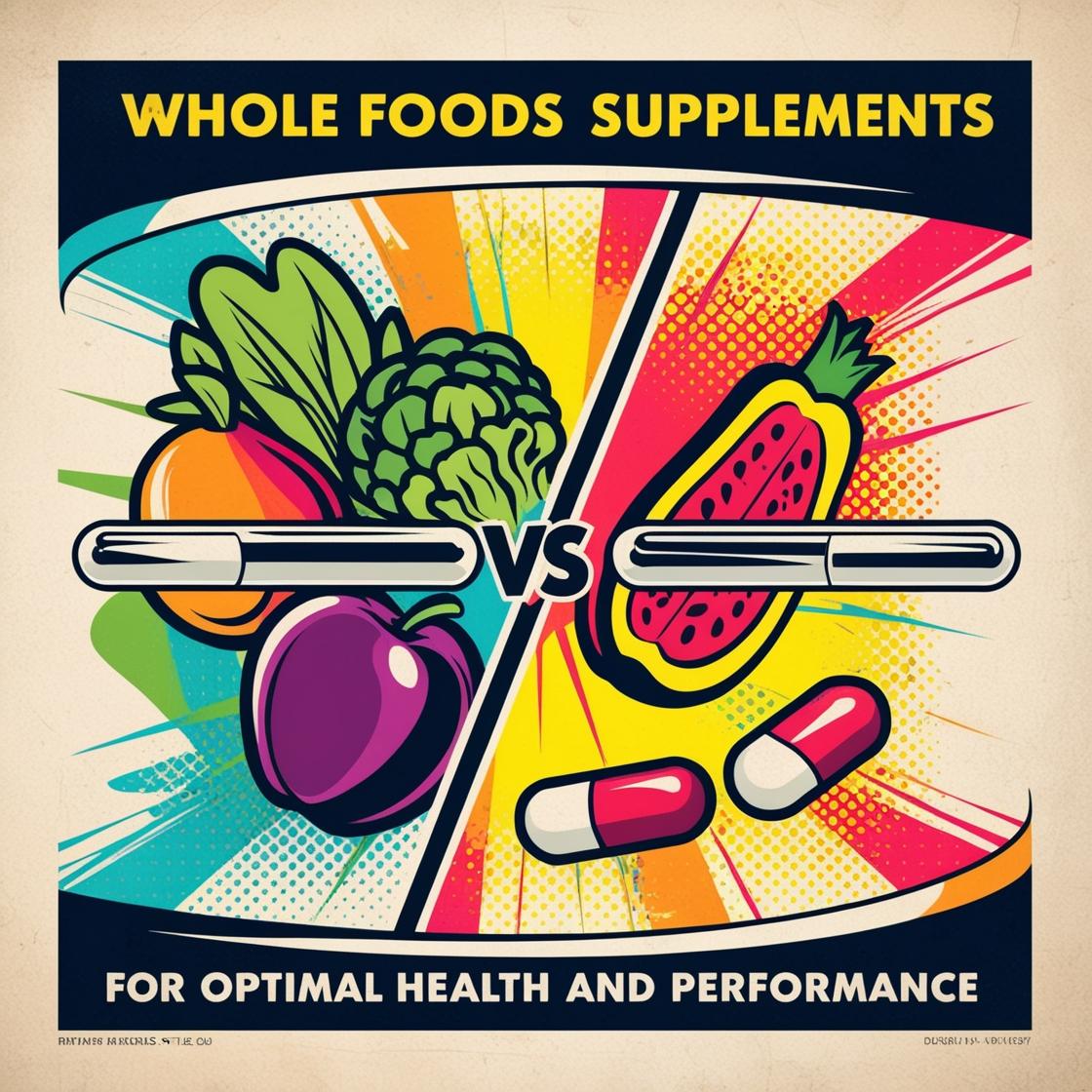By Daniel - TinyVik1ng on 2025-03-13 05:06:55
Type: Nutrition
When it comes to health, nutrition, and athletic performance, one of the most common debates revolves around whole foods versus supplements. Should you rely on a well-balanced diet filled with natural foods, or do supplements offer an easier and more efficient way to meet your nutritional needs? In this extensive guide, we’ll break down the benefits and drawbacks of both whole foods and supplements to help you make informed decisions about your diet and supplementation.
Understanding Whole Foods
Whole foods are natural, minimally processed foods that contain essential nutrients in their most bioavailable and complete form. These include:
| Category |
Examples |
| Fruits and Vegetables |
Rich in vitamins, minerals, fiber, and antioxidants. |
| Whole Grains |
Oats, quinoa, brown rice, etc. |
| Lean Proteins |
Chicken, fish, eggs, beans, tofu, etc. |
| Healthy Fats |
Avocados, nuts, seeds, olive oil, fatty fish, etc. |
| Dairy and Dairy Alternatives |
Milk, cheese, yogurt, etc. |
Benefits of Whole Foods
| Benefit |
Description |
| Complete Nutritional Profile |
Whole foods contain a broad spectrum of vitamins, minerals, fiber, and phytonutrients that work synergistically to support overall health. For example, the vitamin C in bell peppers enhances the absorption of iron from spinach, a benefit lost when taking iron supplements alone [1]. |
| Better Absorption and Bioavailability |
Many nutrients in whole foods are more bioavailable than their synthetic counterparts. For instance, the calcium in dairy is absorbed more efficiently than calcium from supplements [2]. |
| Fiber and Gut Health |
Whole foods provide dietary fiber, which is crucial for digestion, gut health, and blood sugar control. Fiber promotes healthy gut bacteria and reduces the risk of digestive disorders, which supplements alone cannot achieve [3]. |
| Rich in Antioxidants and Phytochemicals |
Whole foods contain a variety of antioxidants and phytochemicals that combat oxidative stress and inflammation. These compounds, found in fruits, vegetables, and whole grains, play a role in disease prevention and overall well-being [4]. |
| Satiation and Balanced Energy Release |
Whole foods provide sustained energy and satiety due to their complex structure. For example, eating an apple provides fiber and hydration, keeping you fuller longer, while drinking apple juice or taking an apple extract supplement lacks the same effect. |
Understanding Supplements
Supplements are concentrated sources of nutrients that help fill gaps in your diet. They come in various forms, including pills, capsules, powders, and liquids. Common supplements include:
| Supplement |
Description |
| Multivitamins |
Provide a mix of essential vitamins and minerals. |
| Protein Powders |
Whey, casein, plant-based options for muscle recovery and growth. |
| Omega-3 Fatty Acids |
Fish oil, algae oil for heart and brain health. |
| Creatine |
Enhances athletic performance and muscle strength. |
| Vitamin D, B12, Iron, and Calcium |
Commonly supplemented nutrients for specific deficiencies. |
| Pre-workout and Post-workout Supplements |
Designed to boost energy, endurance, and recovery. |
Benefits of Supplements
| Benefit |
Description |
| Convenience and Accessibility |
Supplements offer an easy and quick way to meet nutrient needs, especially for busy individuals, athletes, or those with dietary restrictions (e.g., vegans needing B12). |
| Correcting Deficiencies |
Some people have nutrient deficiencies due to poor diet, medical conditions, or absorption issues. For example:
| Vitamin D |
Hard to obtain from food alone, making supplementation necessary in low-sunlight regions [5]. |
| B12 |
Crucial for vegans and vegetarians who don’t consume animal products [6]. |
| Iron |
Helps those with anemia or heavy menstrual cycles [7]. |
|
| Enhanced Athletic Performance |
Athletes use supplements like protein powders, creatine, and branched-chain amino acids (BCAAs) to improve muscle recovery, strength, and endurance. Supplements can enhance performance when used correctly [8]. |
| Precise Dosage |
Supplements allow for precise control over nutrient intake, which is useful for individuals tracking macros and micros, especially those on specific fitness or medical regimens. |
Potential Drawbacks of Whole Foods and Supplements
Whole Foods Drawbacks
| Drawback |
Description |
| Time-consuming Preparation |
Preparing whole food meals takes time and effort compared to the convenience of supplements. |
| Cost |
Organic and high-quality whole foods can be expensive compared to some supplements. |
| Nutrient Loss in Cooking |
Some nutrients are lost during food processing and cooking (e.g., vitamin C is sensitive to heat) [9]. |
Supplement Drawbacks
| Drawback |
Description |
| Not a Replacement for Real Food |
Supplements lack fiber and the synergistic benefits of whole food nutrients. |
| Over-supplementation Risks |
Taking excessive amounts of certain nutrients (e.g., fat-soluble vitamins A, D, E, and K) can be toxic [10]. |
| Quality Concerns |
Some supplements contain fillers, contaminants, or unregulated ingredients. Always choose third-party-tested products from reputable brands like NSF, USP, or Informed-Sport certified products [11]. |
| Absorption Issues |
Some synthetic vitamins are not as well absorbed as natural ones. For example, synthetic folic acid may not be as effective as natural folate found in foods [12]. |
When Should You Prioritize Whole Foods?
| Situation |
Reason |
| If you can meet your nutrient needs through a well-balanced diet. |
Whole foods should be your primary source of nutrition. |
| If you’re focused on long-term health, weight management, and disease prevention. |
Whole foods offer the best approach. |
| If you want better digestion, fiber intake, and sustained energy levels. |
Whole foods are superior. |
Example: A 30-year-old office worker with no dietary restrictions can easily meet their nutritional needs with a diet rich in fruits, vegetables, lean proteins, and whole grains, making supplements unnecessary.
When Are Supplements Necessary?
| Situation |
Reason |
| If you have specific deficiencies diagnosed by a doctor (e.g., iron, vitamin D, B12, omega-3s). |
Supplements can help correct deficiencies. |
| If you are an athlete or bodybuilder requiring higher protein intake or specific performance-enhancing nutrients. |
Supplements can enhance performance and recovery. |
| If you have dietary restrictions (e.g., vegans, lactose-intolerant individuals, people with food allergies). |
Supplements can fill nutritional gaps. |
| If you live in areas with limited access to fresh whole foods. |
Supplements can provide essential nutrients. |
Example: A vegan athlete may need to supplement with B12, iron, and plant-based protein powder to meet their nutritional needs and support their training regimen.
Common Myths About Whole Foods and Supplements
| Myth |
Reality |
| Supplements can replace a poor diet. |
Supplements are designed to fill gaps, not replace whole foods. A diet high in processed foods and low in nutrients cannot be "fixed" by supplements alone. |
| All whole foods are inherently healthy. |
While whole foods are generally nutritious, some (like fried foods or sugary fruits in excess) can be unhealthy if consumed inappropriately. |
| More supplements mean better health. |
Over-supplementation can lead to toxicity and adverse health effects. Always follow recommended dosages. |
How to Choose High-Quality Supplements
| Step |
Description |
| Look for Third-Party Testing |
Choose supplements certified by organizations like NSF, USP, or Informed-Sport to ensure quality and safety. |
| Check the Ingredient List |
Avoid supplements with unnecessary fillers, artificial colors, or preservatives. |
| Research the Brand |
Opt for reputable brands with transparent manufacturing practices and positive customer reviews. |
| Consult a Healthcare Professional |
Always seek advice from a doctor or dietitian before starting any new supplement. |
Final Verdict: Balance is Key
Whole foods and supplements each have their place in a well-rounded diet. Ideally, you should aim to get most of your nutrients from whole foods while using supplements strategically to fill gaps. Whole foods provide unmatched nutritional benefits, while supplements serve as an efficient backup when needed.
For optimal health, focus on a diet rich in fruits, vegetables, lean proteins, whole grains, and healthy fats, and use supplements when necessary based on personal needs, activity levels, and medical conditions. Always consult a healthcare professional before adding new supplements to your routine.
Self-Reflection Questions
| Question |
| Do I currently meet my nutrient needs through whole foods alone? |
| Are there any gaps in my diet that could be addressed with supplements? |
| Have I consulted a healthcare professional about my supplement use? |
| Am I choosing high-quality, third-party-tested supplements? |
No excuses. No shortcuts. Just strength. Fuel your body the right way and unlock your full potential with Halls of Strength!
References
| Reference |
| 1. National Institutes of Health (NIH). "Vitamin C and Iron Absorption." |
| 2. Harvard T.H. Chan School of Public Health. "Calcium and Milk: What’s Best for Your Bones?" |
| 3. Mayo Clinic. "Dietary Fiber: Essential for a Healthy Diet." |
| 4. World Health Organization (WHO). "The Role of Phytochemicals in Disease Prevention." |
| 5. NIH. "Vitamin D Fact Sheet for Health Professionals." |
| 6. NIH. "Vitamin B12 Fact Sheet for Health Professionals." |
| 7. NIH. "Iron Fact Sheet for Health Professionals." |
| 8. Journal of the International Society of Sports Nutrition. "Creatine Supplementation and Athletic Performance." |
| 9. Food Chemistry Journal. "Nutrient Loss During Cooking." |
| 10. NIH. "Vitamin Toxicity: What You Need to Know." |
| 11. NSF International. "What is NSF Certification?" |
| 12. NIH. "Folate Fact Sheet for Health Professionals." |







